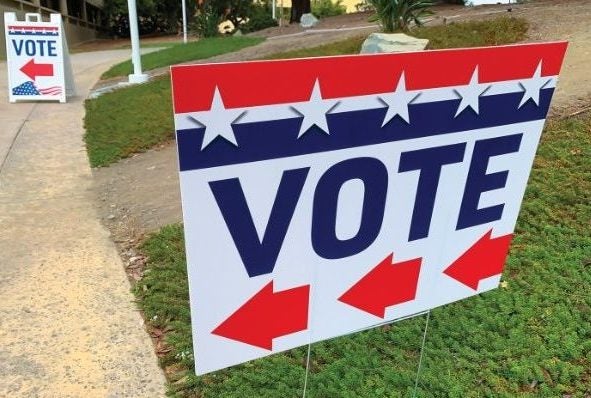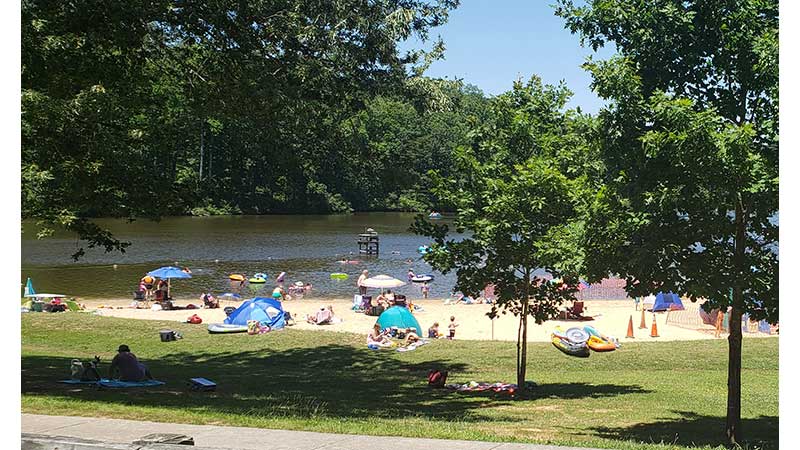Herald Election 2023 Q & A: State House District 50
Published 8:23 am Sunday, October 15, 2023
|
Getting your Trinity Audio player ready...
|
Like most districts in Virginia politics, thanks to redistricting, House District 50 is getting moved and a new face will be representing the area later this fall. Currently, Michelle Maldonado represents the area in the House of Delegates, including Manassas and parts west of Warrenton. The 2023 elections are the first under Virginia’s newly redrawn maps and now, the district has shifted to parts of Central and Southside.
That includes parts of Prince Edward County, along with all of Charlotte, Lunenburg and Mecklenburg counties. And a relocated district, as we mentioned, means new candidates running for the seat.
Democrat Josh Blakely is one of those candidates. The Farmville native is an educator, minister and public speaker with leadership experience in higher education, community organizations and the Virginia Conference of The United Methodist Church. This marks his first venture into political campaigns.
Blakely’s opponent in this year’s race is Republican Tommy Wright. Wright currently represents the 61st District in the House, covering Amelia, Cumberland, Mecklenburg and Nottoway counties, along with parts of Lunenburg. But in the redistricting, he was drawn out of that district. Instead, the Victoria resident finds himself living in District 50 territory.
Now questions for this Q & A were sent to both candidates back in September, with each one given the same amount of time to answer. As of Wednesday, Oct. 10, more than three weeks after they were sent out, only Josh Blakely had answered the questions, despite repeated attempts to remind Wright and his campaign of the upcoming deadline. As a result, Blakely’s answers are the only ones included here.
Q. Let’s start with education. The physical condition of schools across the region is a problem. Prince Edward Elementary is a prime example, but definitely not the only one. Do you believe that the General Assembly has a role in fixing them? If so, how would you go about doing it?
Blakely: The General Assembly absolutely has a role in addressing the physical condition of our schools, though it needs to go hand-in-hand with work at the local level – both in local government and community advocacy. Unfortunately, in more than one county in District 50, nearly all of that work has fallen to the feet of the counties themselves. Prince Edward is a prime example of how the General Assembly is handcuffing local counties in improving their schools.
When I created the Prince Edward County School Advocates in 2020, I did so to push for improvements in the physical infrastructure of the county schools and for changes in school system leadership. With time and much advocacy, the PECPS School Board and the Board of Supervisors reached consensus on the need for a new elementary school building and hired an architecture firm to provide a plan and next steps for the new construction.
However, at the same time, the General Assembly refused to take up the 1% sales tax referendum measure that it had previously allowed other counties in District 50 to utilize. The funding from that tax, coupled with reallocated local funds from the county, would have allowed Prince Edward County to comfortably fund the new school without overburdening its citizens through specific sources of revenue, such as property taxes.
In short, the General Assembly needs to accept its responsibility for the failing school infrastructure and its role in helping local counties like Prince Edward address these issues. In fact, the General Assembly knows that it bears responsibility for the underfunding of our public schools because its own audit committee put out a report to that effect this year. To address these historic deficiencies, we need to strike a balance between funding generated by localities, monies from the state (either through loans or grants), and whatever federal support is available. If elected, I would gladly carry the 1% tax referendum and would propose expanding the Virginia School Construction Assistance Program.
Q. Beyond school construction, what is the Assembly’s role in helping counties with economic development? How can you help in this area?
Blakely: Anyone who has had the experience of trying to find a plumber, electrician, or carpenter in our area knows how frustrating it can be. We do not have enough local tradespeople to keep up with the demand of the work in the area, so we often have to bring in people from surrounding communities at an added expense and increased wait times. We have an opportunity here in District 50 to fill this “trades desert” with highly skilled, hard-working citizens. It will require us to find the correct mix of incentives for training and support for long-term success. Through a combination of allocations to career and technical programs through counties, expanding vocational offerings at our local community colleges, and incentivizing small business start-ups for people entering the trades, we can boost our local economy, address a deficiency in our region, and create jobs.
Q. We can’t ignore the controversy happening right now in this region. In the current budget, the Department of General Services placed language giving Prince Edward permission to run water lines into neighboring Nottoway County, providing water for the Nottoway Correctional Center, the Piedmont Geriatric Hospital and the town of Burkeville, upon their request. It’s worth mentioning this is the first time in Virginia history such a thing has been allowed without the county’s permission or request. To be clear, Nottoway County neither requested nor wants Prince Edward to run a water line. The town of Crewe in Nottoway currently provides all three with water, and losing those contracts will seriously damage the town’s yearly revenue. All three operations say Crewe can’t provide what they want for future needs. As a funding request for this project could likely come for a vote in the Assembly, how would you handle it?
Blakely: This is a complex issue. For a period of a few years now, the state has been pursuing another source of water for its facilities located in Nottoway County. In 2022, the Department of General Services (DGS) entered into a Memorandum of Understanding with Prince Edward County pursuant to a project to expand the Sandy River Reservoir and in furtherance of an appropriation found in the 2020 state budget (Item C-67.D. of Chapter 1289, 2020 Acts of Assembly).
A subsequent provision found in the budget, which passed at the called 2023 General Assembly session, further cemented the State’s intention to move forward with this plan. Ultimately, any resolution to this will come from DGS and the leaders from both counties sitting down to determine next steps. I look forward to working with the leadership of the area to find a way forward.
Q. Let’s switch to another controversial topic. Since 2019, the Prince Edward Board of Supervisors has been seeking permission to implement a 1% sales tax. During that time, multiple other counties and cities in Virginia have been given permission by the Assembly to do the same, but Prince Edward’s request keeps dying before it even goes to a full floor vote. Would you support Prince Edward’s effort and agree to file this bill if elected? Why or why not?
Blakely: Absolutely. As mentioned previously, the General Assembly’s refusal to allow Prince Edward County to implement that tax to address a very real need (a need that would benefit our county for decades to come) is puzzling at best, and neglectful at worst. That other counties have been granted permission to implement a similar tax but Prince Edward’s request continues to be ignored further begs the question of why the General Assembly is seemingly ignoring a priority that is very real for a majority of citizens in Prince Edward.
As a citizen, I advocated at the General Assembly the last time this bill came up (when it was tabled in committee). I organized a group of parents and citizens in a letter-writing and phone campaign to sway the legislators to allow us to take care of our childrens’ schools. However, it seems that since the voices of our Supervisors and Prince Edward citizens are being ignored by the General Assembly on this issue, the only way to make ourselves heard is to elect a delegate who will ensure this issue becomes a priority for the General Assembly. As such, I will happily carry Prince Edward’s request and have designated this bill as one of the first I will pre-file after I am elected.
Q. Gov. Youngkin has raised the concept of a 15-week abortion ban as a consensus he believes voters would support in Virginia. As this will likely come before the Assembly in next year’s session, where do you stand on the idea?
Blakely: It is important to note what extremists are doing in this debate over abortion. Over 70% of Virginians believe that our abortion laws should remain unchanged or become less strict. Yet, a loud minority believes abortion should be banned altogether or the limit should be set at an ultra-extreme limit of 6 weeks – prior to when most people know they are pregnant.
This is a rhetorical move on the extremists’ part to make a 15-week ban seem reasonable when it is not what the citizens of Virginia want – as is well-documented by a wealth of independent research. Ultimately, all of this is a distraction and an effort to roll back the rights of our citizens. The bottom line is that the data shows access to abortions has increased wages and improved access to education for women. By contrast, when abortion is denied, then people experience worse financial outcomes – as, once again, is well-documented by numerous independent and impartial sources.
Finally, we’ve seen a number of these draconian laws go into effect across the country, and their effects are becoming clear. Health outcomes are declining, poverty is increasing, and medical providers are fleeing these states for fear of reprisal, further widening the health care deserts in rural areas. Virginians don’t want this, and it’s unclear why some Republicans insist on harming our people and our economy.
Q. The original law that legalized marijuana in Virginia also created a pathway to legalized sales by 2024. But for that to happen, a market framework needs to be established, including how it would be regulated, taxed and how sellers would be licensed. Where do you feel we need to go from here, when it comes to legalized marijuana?
Blakely: When the General Assembly enacted the pathway to full legalized marijuana sales in 2021, it created the Virginia Cannabis Control Authority and specifically tasked it with “control of the possession, sale, transportation, distribution, and delivery of retail marijuana and retail marijuana products in the Commonwealth” (Va. Code § 4.1-601). From here, this group needs to fully flesh out the called-for social equity license process so that the communities that have “been disproportionately policed for marijuana crimes” (Va. Code § 4.1-606) can fully engage with this new avenue for economic prosperity. The responsibility of establishing the proper framework for legalized marijuana sales still lies with that committee, and I look forward to receiving an update on the implementation of this program when I go to the General Assembly in the new year.





